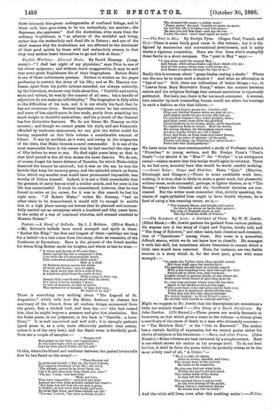English Worthies : Admiral Blake. By David Hannay. (Long. mans.)—"
I died last night of my physician," says Prior in one of his clever epigrams ; and without much exaggeration, it may be said that some great Englishmen die of their biographers. Robert Blake is one of these unfortunate persons. Failure is written on the pages professing to contain the story of his life ; and as Mr. Hannay con- fesses, apart from his public actions recorded, not always correctly, by the historians, we know very little about him. "Faithful and active, stoat and valiant, he was by the consent of all men ; but a bundle of adjectives do not make an individuality." The biographer is fully alive to the difficulties of his task, and it is not wholly his fault that he has not overcome them. Several important errors he has corrected, and some of lees significance he has made, partly from attaching too much weight to doubtful authorities; and his portrait of the General has few distinctive features. We do not blame Mr. Hannay on this account ; and though we cannot praise his style, and are frequently offended by irrelevant statements, we can give the writer credit for having expended on this little volume a considerable amount of labour. It was by accident, as it were, and owing to the exigencies of the time, that Blake became a naval commander. It is one of the most memorable facts in his career that he had reached the ripe age of fifty before he went to sea. He died eight years later, so that to that brief period is due all that makes his name famous. We do not, of course, forget his brave defence of Taunton, for which Blake richly deserved the honour he received ; but it was on the sea he won the laurels that keep his memory green, and the splendid attack on Santa Cruz, which any smaller man would have pronoanoed impossible, was worthy of Nelson himself. Indeed, it is not a little remarkable that the greatest of naval heroes tried a similar attack, and for once in his life was unsuccessful. It must be remembered, however, that he was forced to retire at the outset, for it was in this assault he lost his right arm. "If Robert Blake," writes Mr. Hannay, "had no other claim to be remembered, it would still be enough to entitle him to a high place among our heroes that he planned and success- fully carried out an enterprise which a hundred and fifty years later, in the midst of a war of continual victories, still seemed overbold to Horatio Nelson."




































 Previous page
Previous page